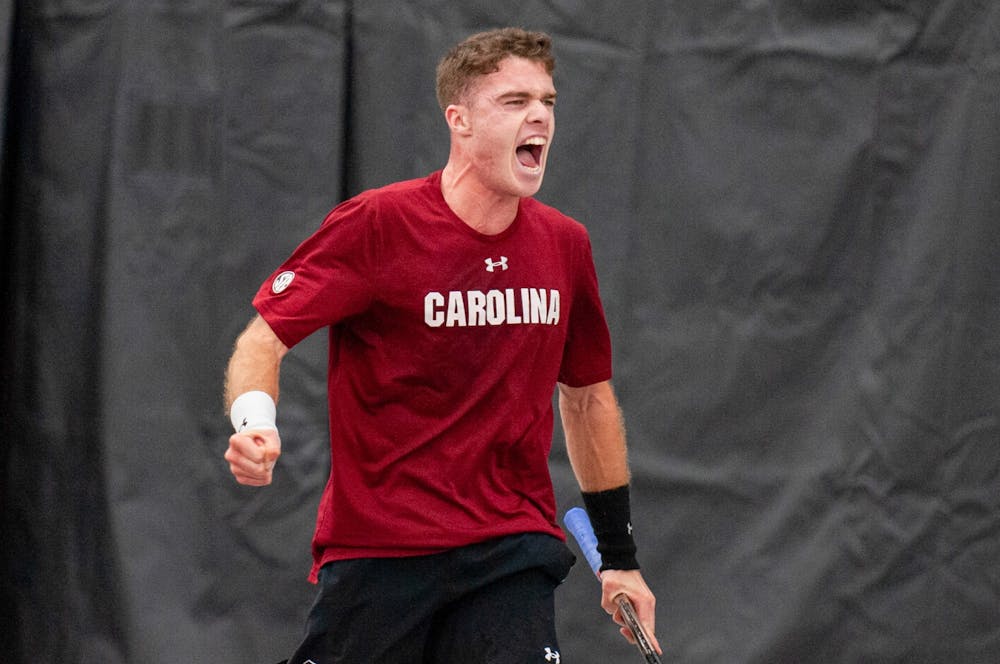When the Gamecock's men tennis team needed one more game to clinch the match against Mississippi State, junior Daniel Rodrigues set himself up to serve and launched the ball towards the other side of the net.
After a brief rally, his opponent returned a shot that landed just out of bounds. Rodrigues dropped his racket and held his fist in the air, beating his chest as he walked towards his teammates in celebration.
“He has an alpha personality, which is absolutely necessary to be a successful individual athlete,” head coach Josh Goffi said.
Since then, he has accumulated 102 singles and 68 doubles victories in his collegiate career and spent some time as the No. 1 singles player in the ITA rankings during his sophomore year.
Beneath that passionate demeanor is a tennis player who takes pride in mastering the mental side of the game.
Rodrigues played multiple sports at a young age in his native country, Portugal, and said he had to decide early in his career which single sport to pursue.
“I started with tennis and soccer because soccer is a big thing in Europe, but I had to choose eventually, and I thought I was better at tennis,” Rodrigues said.
He said he decided to continue playing tennis in the United States because he believed it would better prepare himself for the professional game.
“The only reason I came was, if I couldn’t be at the top of the college standings, I could never reach the top of the (ATP) Tour,” Rodrigues said.
Now ranked No. 3, Rodrigues oftentimes finds himself facing off against the opposing team’s best singles player and emerges victorious in most cases — he has a 40-7 record when playing from the No. 1 position in the singles lineup.
Rodrigues said he has specific ways of preparing himself mentally before each match against a high-level opponent.
“The night before, I try to imagine what’s going to happen — bad scenarios, good scenarios, everything — so I’m pretty much ready for everything that I’m going to face because I know it’s going to be tough no matter what,” Rodrigues said.
Mental toughness is what Rodrigues uses against these difficult opponents because he said he "doesn't have peak weapons like many other guys do in the Tour."
Whenever he encounters a difficult situation during a match or at practice, Rodrigues utilizes certain mental strategies to regain his composure.
“I meditate every day. It’s one of the ways that I get centered, and I don’t get too much stress around my life, so that’s good,” Rodrigues said. “And I also have routines that I do every day. I stretch at the end of the day also releases a little bit of pressure.”
Goffi said Rodrigues’ growth in both the physical and mental aspects of the game has helped him become a leader on the team.
“He’s a leader by action more than voice — we have our emotional leaders, we have our verbal leaders — and people just fall into those roles ... He’s naturally just been a leader by example,” Goffi said.
Junior Raphael Lambling said Rodrigues had a similar positive impact on his teammates that helps to motivate them.
“He’s been pushing everyone forward — and everyone on the top — to bring everyone with him from freshman year to now, which is very good, and that just makes the team better every day,” Lambling said. “And seeing him compete at this level just makes us want to compete at that level as well.”
Rodrigues' doubles partner, sophomore Connor Thomson said he and Rodrigues' differing styles of play counterbalance each other on the court and created a chemistry between them. The duo is ranked No. 13 in the ITA tennis rankings and hold a 13-4 record on the year with several wins against pairs in the top ten.
That chemistry extends off the court as well. Thomson said he has "always seen (Rodrigues) as a leader, a friend, (and) a brother."
“I feel like there are ups and downs — we’ve had our fights and all that stuff — but we always came through it, and no matter what, he’s always been true to his word, and he’s set an example for myself and even the younger guys,” Thomson said.
Rodrigues said he is confident in his ability to eventually have a successful career playing professional tennis.
“I know guys around me that, even (Paul) Jubb, that’s played here as well — I know he just won a Challenger,” Rodrigues said. “I know I have the ability to do that eventually if I keep working hard.”
Goffi said what Rodrigues learned in his time at the program — understanding "what it was going to take to be successful" and "how to grow" — will pay dividends wherever his future takes him.
"He is just like anybody else that's been great at our program and been one of the best players in the country," Goffi said. "They have that as a common denominator: they fundamentally understand the daily grind."

